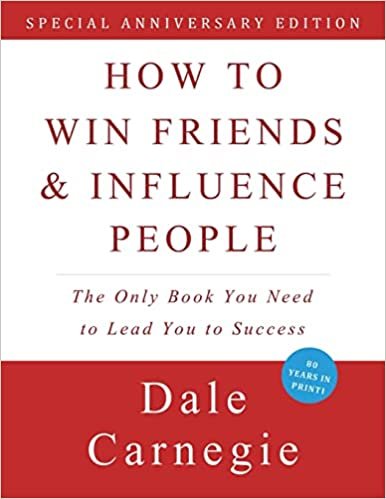
Dale Carnegie’s book was a gateway to several other books that had practical solutions to self-improvement in communications. I’m not fond of the narrative type to convey a lesson but it’s one of the best ways to demonstrate examples.
Dale Carnegie raises a good point about social communication being a life skill is undervalued in the educational system. He points out that we as humans, are social creatures yet exist in a society where we somehow fail to make use of our fullest potential in connecting with other people. While the book does make an interesting proposition from the title, the effects when done right can take over months to years to be noticeable.
Remember the way you communicate now is the product of years of communication habits in sync with your attitude towards people. When you wake up in the morning and start applying some of the lessons here, people around you may not readily going to see the difference. I'm sure each person has a mental image of how they view their significant others based on their communication style.
The book didn’t teach me how to be charismatic but I do appreciate it setting up the foundations to be one. I view charisma as a skill you have ingrained into the subconscious that your actions make people more receptive of you.
What the book taught me is making less unnecessary enemies (not kicking the bees nest) through what I originally thought were benign interactions, making me self-aware about different social situations, extending my patience in dealing with people, diffuse conflicts, and most of all, having some grit in dealing with passive-aggressive types.
The book tackles more on the principles and cites some specific examples that apply those principles. It really made a good point about how communication is being underrated and not emphasized with the current educational system. How can a life skill so crucial not have a subject dedicated to it when mastering it can change someone’s life?
The art of not making enemies is just as important as making friends. If you have 10 co-workers in a room, having 2/10 of those become your enemy is a long term pain even with 8/10 being your friends. Out of a hundred compliments you can receive, you know it only takes 1 rude remark from someone you dislike can potentially upset you if you're sensitive enough.
When it comes to arguments, pick your battles and try to not get too worked up about losing. Sometimes a short term victory over an argument isn't worth the long term grudge someone would be nursing against you in a workplace.
The approach to the book is taking one chapter a day and reflecting on it. It worked for me anyway. When I started going through the book by a binge read session, the lessons just came and went because there less mental time to focus on what was emphasized by the chapter.
Think of it as learning what a cell phone does in a quick rundown, you may be able to call, text, go online and use the apps within an hour without a problem. But then you discover some small life hacks to make each feature on the phone even better like organizing messages, blocking numbers, fine tuning the settings display and lots of other good stuff the device offers.
It’s a weird way to compare how I took the lessons from the book but it made sense for me. The lessons being told by the book are recounts of someone else. These are not your personal experiences. To make the lesson ingrained you have to ground it to how each applies to your life by using old memories, the present or the foreseeable future where you think you can apply them. And this is where it gets even tricky because this requires conscious habit to incorporate in your routine.
I think we can have a consensus of being taught to be nice to other people as common courtesy but you know that’s easier said than done. We weren’t trained to react to different situations where being nice isn’t suitable and we just have to learn it the hard way navigating through life.
While the book says how to influence people is part of the lessons being taught, what I got from reading are practical ways to diffuse tension from people who are in an irritable state with due empathy.
And being able to keep calm and approach people when they are not in their best has been a life changing skill I acquired. If you can convince them that you’re listening and are taking their side into account of your judgment, they will be more receptive even if your verdict doesn’t favor them. It doesn’t work all the time but it makes you less of a target in their eyes and makes them amenable for negotiations, this is influence at work.
I do recommend the book as a start if you want to improve your communication skills. It’s a book for beginners on the subject. I did find better books that tackle on the same subject but their approach may not be as entry level compared to how Dale explains it.
If you made it this far reading, thank you for your time.